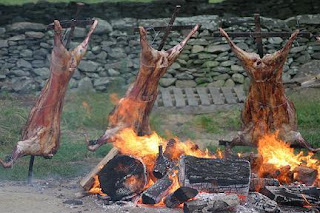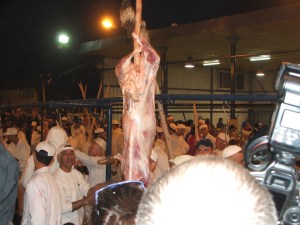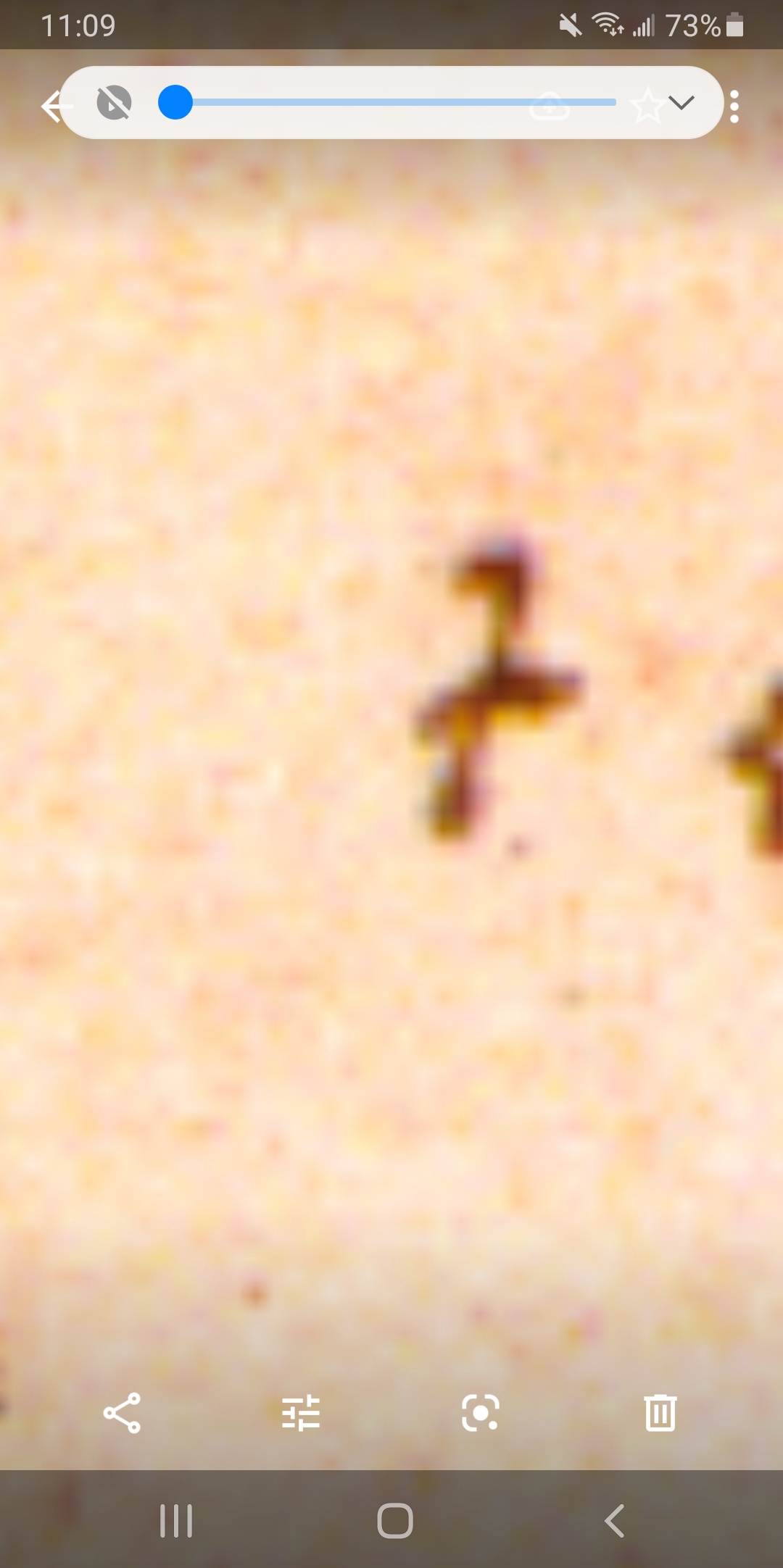And inasmuch as some have also supplied the Scriptures with marks of punctuation, these also are employed as marks of punctuation : acute (accent) '; grave (accent) '; circumflex ^; long (vowel) ; short (vowel) @; rough (breathing) @ ;31 smooth (breathing) @ ;31 apostrophe '; hyphen -; hypodiastole @. Concerning the asterisk, the obelus, the lemniscus, and the hypolemniscus, that is, the signs that are in the divine Scriptures.32 The asterisk is this *; and wherever used it indicates that the word used occurs in the Hebrew, and occurs in Aquila and Symmachus, and rarely also in Theodotion. {47c} But the seventy-two translators passed it by and did not translate it, because such words were repetitious and superfluous. And in elucidation of the things that have been said,33 let it be said by means of a brief quotation, so that from the one instance you may understand others. There occurs in the first part of Genesis w''j 'dhm slw'jm sn' wths' mjwth sn', 34 which is translated, "and Adam lived thirty years and nine hundred years," as Aquila also agrees. Here the seventy-two translators, being Hebrews and having been carefully instructed from early youth in the language of the Hebrews as well as that of the Greeks, did not merely translate the Hebrew writing into the Greek, but also, translating with insight, they retained the expression that was uttered twice among the Hebrews; but, instead of the word "year" being employed in two places, they used it in but one. What was considered lameness they changed to smoothness when [they said, "And Adam lived] nine hundred and thirty years," where, moreover, they did not eliminate {47d} a single word. But they also handed down accurately 35 a reading which in the Hebrew cannot be expressed as concisely as when the seventy-two say, "Adam lived nine hundred and thirty years." But it is not thus in the Greek, so that Aquila translated superficially, saying, "Adam lived nine hundred years and thirty years." For |17 behold, O lover of learning,36 that it does not give smoothness to the sentence, having regard not to clearness of expression but to the exactness of the repetition of the word. Now this seems to some to be an omission made by the seventy-two, while by Aquila and Symmachus and other translators it is translated without any omission. However, there has been no (real) omission by the seventy-two. But, moreover, by the followers of Aquila, with harshness of sound the word is superfluously used in two places instead of one, that is, instead of "years," "year" and "year." 37 Therefore the seventy-two omitted the word "year" in one place. {48a} But when the followers of Aquila came later and filled in the things that had been omitted by the seventy-two, they seemed altogether superfluous. And Origen, coming after them, restored the word that was lacking in every place, but placed the asterisk by it. Not that the word was of necessity required in all cases ----for it was superfluous----but because he would not permit the Jews and Samaritans to find fault with the divine Scriptures in the holy churches, since there is nothing in the words with asterisks disparaging to the faith; for they are (merely) superfluous and repetitious, as we see by reading in the case of Adam and his life, since even from the shorter sentence you are also able to insert the other words by which the asterisks have been placed. But that you may know also why he placed the asterisk {48b} by these words, without malice we have said this also. You know, O reader, that there are stars in the firmament of heaven, even if they are obscured by clouds or the sun. It was with this thought that he acted when he placed the asterisks, that he might show you that the words to which the asterisks are attached are fixed in the Hebrew Scriptures like the stars in the firmament of heaven, but that they have been obscured by the translation of the seventy-two as the stars are obscured by the clouds. This is the significance of the asterisk.
3. As to the story of the obelus, it goes this way. The obelus is that which is made - , for it is written in the form of what is called the line. But according to Attic usage obelus means spear,38 that is, lance. And |18 in the divine Scriptures it is placed by those words which are used by the seventy-two translators but do not occur among the followers of Aquila or Symmachus. For the {48c} seventy-two translators added these words of themselves, not uselessly but, rather, helpfully. For where they added words lacking in these (other versions), they gave clearness to the reading, so that we regard them as not disassociated from the Holy Spirit. For they omitted those that had no need of repetition; but where there was a word that was considered ambiguous when translated into the Greek language, there they made an addition. This may be surprising, but we should not be rash to bring censure, but rather praise that it is according to the will of God that what is sacred should be understood. For while they were seventy-two in number and on the Pharian island, but called Anoge,39 opposite Alexandria, they were in thirty-six cells, two in each cell. From morning to evening they were shut up, and in the evening they would cross over in thirty-six small boats and go again to the palace of Ptolemy Philadelphus and dine with him.40 {48d} And each pair slept in (one of) thirty-six bedchambers, so that they might not talk with one another, but might produce an unadulterated translation. Thus they conducted themselves. For, having constructed the thirty-six cells already mentioned, over on the island, and formed them into pairs, Ptolemy shut them up in them two by two, as I have said. And with them he shut up two youths to minister to them in preparing food and (in other) service, and also skilled 41 scribes. Moreover, he had made no opening into these cells through the walls, but in the roof above he opened what are called roof windows. But while thus abiding from morning to evening shut in by locks, they were translating as follows. To every pair one book was given. That is to say, the book of the Genesis of the Avorld to one pair, the Exodus of the Israelites to another pair, that of Leviticus to another, and the next book in order to the next; and thus were translated the twenty-seven {49a} recognized canonical books, but twenty-two when counted according to the letters of the alphabet of the Hebrews. |19
4. For the names of the letters are twenty-two. But there are five of them that have a double form, for k has a double form, and m and n and p and s.42 Therefore in this manner the books also are counted as twenty-two; but there are twenty-seven, because five of them are double. For Ruth is joined to Judges, and they are counted among the Hebrews (as) one book. The first (book) of Kingdoms 43 is joined to the second and called one book; the third is joined to the fourth and becomes one book. First Paraleipomena is joined to Second and called one book. The first book of Ezra is joined to the second and becomes one book.44 So in this way the books are grouped into four "pentateuchs," and there are two others left over, so that the books of the (Old) Testament are as follows: the five of the Law---- {49b} Genesis,45 Exodus, Leviticus, Numbers, Deuteronomy----this is the Pentateuch, otherwise the code of law; and five in verse----the book of Job, then of the Psalms, the Proverbs of Solomon, Koheleth, the Song of Songs. Then another "pentateuch" (of books) which are called the Writings, and by some the Hagiographa, which are as follows: Joshua the (son) of Nun, the book of Judges with Ruth, First and Second Paraleipomena, First and Second Kingdoms, Third and Fourth Kingdoms; and this is a third "pentateuch." Another "pentateuch" is the books of the prophets----the Twelve Prophets (forming) one 46 book,46 Isaiah one,46 Jeremiah one,46 Ezekiel one,46 Daniel one 46----and again the prophetic "pentateuch" is filled up.47 But there remain two other books, which are (one of them) the two30 of Ezra that are counted as one, and the other the book of Esther. So twenty-two books are completed according to the number of the twenty-two {49c} letters of the Hebrews. For there are two (other) poetical books, that by Solomon called "Most Excellent," 48 and that by Jesus the son of Sirach and grandson of Jesus----49 for his grandfather was named Jesus 49 (and was) he who composed Wisdom in Hebrew, which his grandson, |20 translating, wrote in Greek----which also are helpful and useful, but are not included in the number of the recognized; and therefore they were not 50 kept in the chest, that is, in the ark of the covenant.
5. But, further, this also should not escape you, O lover of the good, that the Hebrews have also divided the book of Psalms into five books, so that it is yet another "pentateuch." For from the first Psalm to the fortieth they reckon one book, and from the forty-first to the seventy-first they reckon a second; from the seventy-second to the eighty-eighth they make the third book; for the eighty-ninth to the one hundred fifth they make the fourth; from the {49d} one hundred sixth to the one hundred fiftieth they unite into the fifth. For every Psalm that had as its conclusion, "Blessed be the Lord, so be it, so be it," they thought to be appropriately the end of a book. And this is found in the fortieth and in the seventy-first and in the eighty-eighth and in the one hundred fifth, 51 and (thus) the four books are completed.51 But the conclusion of the fifth book, instead of the "Blessed be the Lord, so be it, so be it," is "Let everything that breathes praise the Lord! Hallelujah!" For when they thus reckoned they thereby completed the whole matter.52 Thus they are twenty-seven; but they are counted as twenty-two, even with the book of Psalms and those by Jeremiah----I mean Lamentations and the epistles of Baruch 51 and of Jeremiah,51 although the epistles are not in use among the Hebrews, but only Lamentations, which is joined to Jeremiah. In the way we have related they were translated. They were given to every pair {50a} of translators in rotation, and again from the first pair to the second, and from the second pair to the third; and thus they went, every one going around.37 And they were translated thirty-six times, as the story goes,53 both the twenty-two 54 and the seventy-two 54 that are apocryphal.
6. And when they were completed, the king sat on a lofty throne; and thirty-six readers 55 also sat below,55 holding thirty-six duplicates |21 of each book, and one had a copy of the Hebrew Scriptures. Each reader read alone, and the others kept watch. No 56 disagreement was found, but it was such an amazing work of God that it was recognized that these men possessed the gift of the Holy Spirit, because they agreed in translation. And wherever they had added a word all of them had added the same, and where they had made an omission all alike had made the omission. And there was no need for the omitted words, but for those they added 57 there {50b} was need. But that what is said may be clear to you, how marvelously, under the guidance of God and in the harmony of the Holy Spirit, they translated harmoniously and were not at variance with one another, in order that thereby knowing and being assured you may agree with our statement, I shall give you a demonstration of these things by means of a brief quotation.43 In the one hundred fortieth Psalm it is put in the Hebrew thus: °dhonj 'lkh qrjth, sm' 'jlj, 'bhjt' 'qol, 58 which is, being translated, "O Lord, I have cried unto thee; answer me; consider the voice." But the Hebrew does not have "of my request." 59 Behold, then, how lame it is found to be! So the seventy-two translators, when they added "of my request," made the line unhalting and translated: "O Lord, I have cried unto thee; answer me; consider the voice of my request." And behold in what beautiful style the psalm is (now) chanted! Understand then, from this very brief statement, the similar things {50c} inserted by these translators everywhere in the additions, for the words are well added in explanation 60 and for the advantage of the peoples about to be called to the faith of God and the obtaining of the inheritance of life from the divine words of the Old Testament and the New.
7. And in the same way also, Origen, doing well in making use of the asterisk, likewise also made use of the obelus as a symbol. Oh that he had done the other things as well! For when he had placed the six translations and the Hebrew writing, in Hebrew letters and words, in one column (each), he placed another column over against the latter, |22 in Greek letters but in Hebrew words, for the comprehension of those unacquainted with the Hebrew letters, so that by means of the Greek they might know the force of the Hebrew words. And so, in the Hexapla or Octapla, which is 61 by him, where the two columns {50d} of Hebrew and the six translations he set in order side by side, he has contributed to the lovers of the good a great increment of knowledge. If only in his discourses he had not erred, bringing harm to the world and to himself, when he taught wrongly the things pertaining to the faith and explained most of the Scriptures in an unorthodox manner. But I will take up the account of the obelus again.62 Now we have said that obelus means lance, but the sword is the destructive one.63 Where therefore the word is found to be used by the seventy-two but does not occur in the Hebrew, by the sign of the obelus placed beside the word it is known that the word is to be lifted up 63 from the native place, that is to say, from the soil of the Scriptures, as something that is not in the place in the Hebrew Scripture. And I have explained the things pertaining to the asterisk and the obelus.
8. 64 Concerning the lemniscus.64 But I must tell the things pertaining to the lemniscus ÷ and the hypolemniscus @ . {51a}The lemniscus, as the sign is here placed, is that which is written ÷. It is a line between two dots, that is to say, points, one being above and one below. And it is found among physicians in physiology, and gets its name from surgery upon the body. When (the flesh) is separated, that is to say, cut apart, by two straight cuts, then in the middle of the two divisions of the cut place, because of the cuttings,65 each one straight, the figure of the obelus is completed on the body. But when the dressing 66---- which is a piece of linen cut off in a form long and narrow----is applied on one side of the cut and crosses to the other, it is well called by physicians the lemniscus, because of the overflowing (pools) when the |23 dressing is flooded by the discharge from the place.67 Therefore this kind of sign also they attach to the divine words, that when {51b} there is found in rare instances in the translation of the seventy-two a dissonant word, neither subtracted from nor added to words similar to it, you may know, because of the two points placed by it, that this word was translated by one or two pairs. But they were read in two ways or similarly. And that this also may be clear to you and easy to understand, I would also say concerning it: When you find that it is said 68 in Psalm 70, "My mouth proclaims thy righteousness," 69 70 instead of "proclaims thy righteousness" 70 is "proclaims thy righteousnesses." And again in Psalm 71 70 it says,70 "And their 71 name is honored before him";72 but instead of this it is put, "And their 71 name is honored in his eyes." And so you may find it in many places, where there is nothing taken away or changed but it is the very same (in meaning), though expressed differently, so that it is not foreign to the others;73 they are read both ways. And they are so {51c} indicated by the lemniscus when a word is found thus employed by one or two pairs. Now we have explained sufficiently 74 the things concerning the lemniscus. In like manner also we make explanation concerning the hypolemniscus, so that if you find the sign written ----, which is a simple line having the form of the obelus, with a dot, that is to say, a point, under it, you may know that it is a sign indicating the symbol of the hypolemniscus. Where now it is found placed by a word, it is indicated that by one pair of translators the word was omitted 75 in the place,75 as the single dot indicates, and there is also a double or consonant 76 reading of the word by which it is placed. This is our 77 explanation of the asterisk, the obelus, the lemniscus, and the hypolemniscus, O lover of the good.


